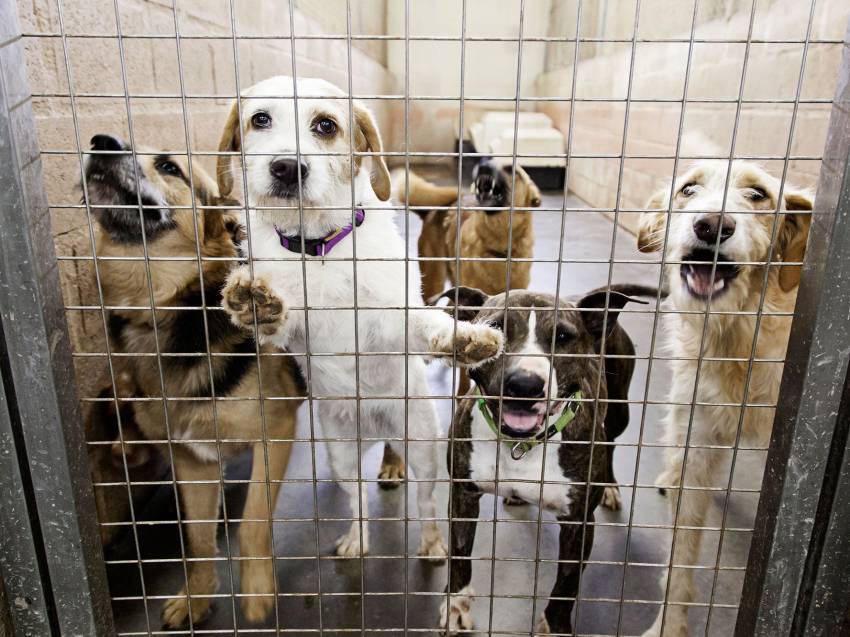Kennel cough in dogs
The dreaded kennel cough is a particularly contagious dog disease that we hear about frequently, but don't necessarily know much about.
Indeed, more than a pathology, kennel cough is a syndrome, a multifaceted and often multi-factorial health condition. To protect your four-legged friend, here is everything you need to know about kennel cough, its symptoms and its main causes.
What is kennel cough in dogs?
Kennel cough, also known as infectious tracheobronchitis, is a respiratory condition frequently encountered in dogs, especially in areas with a dense dog population - typically kennels. Highly contagious, kennel cough is more of a syndrome than a disease. It refers to a combination of symptoms that are characterized by their high epidemic potential and can be caused by a variety of pathogens.
Although it is extremely problematic because of its high contagiousness, kennel cough has only a moderate mortality rate. It is most prevalent in dogs with compromised immune systems, such as puppies, who are more likely to develop severe and potentially lethal symptoms.

Causes of kennel cough in dogs
Many pathogens can cause kennel cough syndrome in dogs. These include a wide range of viruses, bacteria and mycoplasma. It is not uncommon for these different pathogens to associate with each other, opening the door to the others, which then leads to the development of more severe forms.
In the majority of cases, both the Parainfluenza virus and the Bordetella bronchiseptica bacteria are found in dogs with kennel cough.
Causes of viral kennel cough in dogs
The virus most commonly found in kennel cough is canine parainfluenza, which should be distinguished from the influenza virus (Influenza). Parainfluenza, as its name indicates (from "para" meaning "comparable" and "influenza" meaning "flu") is a respiratory pathology causing flu-like symptoms.
Parainfluenza virus infections are highly contagious, but cause a form of respiratory illness that is generally less severe than influenza. Parainfluenza virus replicates in the epithelial cells of the mucous membranes of the respiratory tract, damaging them and abnormally exposing the tissues of the respiratory tract.
As a result, it becomes easy for bacteria to cross the epithelial barrier, and there is usually a proliferation of Bordetella bronchiseptica, which complicates the pathology, and it is the combination of these two pathogens that causes kennel cough syndrome. Two adenoviruses of the mastadenovirus family can also be involved in kennel cough.
These are adenovirus type I (CAV 1), also responsible for infectious hepatitis of dogs (Rubarth's hepatitis), and adenovirus type 2 (CAV 2 or Toronto A). CAV 1 typically causes the classic symptoms of Rubarth's hepatitis, namely a combination of ocular, digestive and nervous disorders, when inoculated orally.
When inoculated by the respiratory route, it causes the typical respiratory symptoms of kennel cough syndrome. CAV2 is more frequently implicated in kennel cough than CAV1 because it is more commonly found in the upper respiratory tract of dogs.
It rarely affects the deep respiratory tract, however, and therefore causes mostly mild symptoms. Canine herpes virus is known to cause a wide range of disorders in dogs, including respiratory conditions that can lead to kennel cough.
While it is potentially fatal in young puppies, in whom it can cause acute systemic infections, it is more likely to result in mild respiratory problems in healthy adult dogs. More rarely, Reovirus (especially type 3) can be found in kennel cough in dogs.
The virus responsible for distemper, a paramyxovirus called Distemper, may also be involved, although it is not strictly speaking a respiratory virus. It does, however, cause respiratory symptoms, especially at the beginning of the infection, which are frequently attributed to a kennel cough before a definitive diagnosis is made.
Causes of bacterial kennel cough in dogs
In most cases, viruses and bacteria work together to cause kennel cough syndrome in dogs. In this case, bacteria are considered to be superinfecting agents. The most common bacteria involved in this respiratory disorder, usually along with the Parainfluenza virus, is Bordetella bronchiseptica.
Bordetella bronchiseptica is a coccobacillus that frequently acts as a superinfectant, but can also cause full-blown kennel cough epidemics on its own. Alone, this bacterium generally causes moderate symptoms, lasting about ten days. When associated with the Parainfluenza virus, it can take a much more severe form.
Mycoplasma is another type of bacteria that is commonly found in infectious tracheobronchitis in dogs. Usually, mycoplasmas are not the only cause of kennel cough. They are almost always associated with other infectious agents, especially viral.
How kennel cough is transmitted in dogs
Transmission of the infectious agents that cause kennel cough, whether bacteria or viruses, is primarily by inhalation. This characteristic makes kennel cough a disease that occurs mainly in enclosed areas where there is a dense population of dogs, hence its name.
The more crowded the dog population, the higher the risk of infection: this is an essential transmission factor to consider. Coughing is considered to be the main factor in the dissemination of infectious agents. Infectious agents are excreted in aerosolized droplets in the air.
To a lesser extent, sneezing and barking may also shed droplets of contaminated substances. Dogs are considered contagious for several weeks when infected with bacteria, for about 10 days when infected with Canine Herpes Virus or adenovirus, and for less than eight days when infected with Parainfluenza virus.
Let us note that the CAV 1, adenovirus responsible for the Hepatitis of Rubarth, can be excreted during several months in the urine of the dog. Finally, it should be noted that some infectious agents are viable on inert surfaces. One considers thus that the Herpes Virus can survive only a few hours in the environment of the dog, while the adenoviruses, more resistant, can remain there several weeks.
Factors that predispose to kennel cough in dogs
Certain factors related to both the dog's health and its environment are likely to promote kennel cough. Animals with weak or undeveloped immune defenses are at greater risk, such as unvaccinated puppies, immunocompromised dogs, and dogs that are convalescing, ill or parasitized.
The dog's environment also plays an important role. An excessively dry atmosphere weakens the epithelial barrier of the respiratory tract, as does a sudden decrease in ambient temperature, or the presence of irritating substances in the air (cigarette smoke, perfume, gas, pollution, etc.).
Dogs living in a community are also considered at risk, as a high density of dogs is highly conducive to direct contagion from dog to dog. Housing conditions should also be taken into account, as a poorly maintained or stressful environment (stress being likely to impair the animal's immune defenses) is highly conducive to kennel cough epidemics.

Symptoms of kennel cough in dogs
The symptoms of canine kennel cough are mainly respiratory, and are divided into two clinical forms: simple and complicated. In the simple form, there is often a benign inflammation of the bronchi and trachea. The dog's general health is not, or only slightly, altered, and the animal has dry, non-productive coughing fits, sometimes followed by vomiting due to the virulence of the cough.
A moderately copious, serous (yellowish) nasal discharge often accompanies the cough. Lesions of the respiratory tract are limited to the upper tract, and spontaneous recovery may occur within 1 to 3 weeks. The simple form of kennel cough mainly concerns adult dogs in good health, vaccinated against distemper and Rubarth's hepatitis, and living in good hygienic conditions, which reduces the risks of bacterial superinfection.
However, sometimes a simple kennel cough can become more severe and complicated. Complicated kennel cough is characterized by damage to the lower respiratory tract (bronchi, bronchioles and lungs). It can occur immediately or follow a simple form.
The dog's general condition is then altered, and one can observe a slump, a lack of appetite, lethargy, and even emaciation. Episodes of fever are common in this form, and the cough is accompanied by mucous and then purulent nasal discharge. The dog often has difficulty breathing, which may result in abnormal respiratory movements.
This severe form of kennel cough mainly affects young dogs with an immature immune system, unvaccinated animals and/or animals in poor hygienic conditions.
Treatment and prognosis of kennel cough in dogs
The treatment of kennel cough in dogs depends on the form encountered and the general health of the animal. With a simple form, the animal may recover without treatment, and it is up to the veterinarian to determine the best protocol for the situation.
Note that even if the dog can do without antiviral or antibiotic treatments, it is essential to present him to a veterinarian in order to evaluate the severity of the disease and to control his symptoms, which are always likely to worsen. Coughing spells, which can be exhausting for the dog and very irritating for the airways, usually require symptomatic treatment (cough suppressant and/or bronchodilator).
An expectorant is also regularly prescribed to help hydrate the airways and avoid aggravating their inflammation, which tends to weaken them and expose them to bacterial attacks. Antibiotic therapy is rarely necessary, but may be prescribed when the animal is housed in hygienic conditions conducive to bacterial superinfections.
In the complicated form of kennel cough, the veterinarian may decide to prescribe mucolytics, drugs that promote the production and liquefaction of mucous secretions in order to clear the airways and excrete pathogens. Antibiotic treatment is often required to control bacterial growth. Identification of the type of bacteria involved is essential for effective antibiotic therapy.
Usually, the prognosis for a dog with kennel cough that is properly treated by a veterinarian is good, with full recovery with symptomatic treatment. However, major complications do exist, and some dogs require a long period of convalescence, and may have long-lasting or even irreversible damage.
It should be noted that in the case of a complicated form, kennel cough is one of the respiratory diseases that can lead to the death of a dog, even a healthy adult. Without treatment, the prognosis of a dog with a severe form is reserved, especially in puppies.

Prevention of kennel cough in dogs
Prevention of kennel cough is all the more important because of the disease's high epidemic potential. Correctly vaccinating your dog against Rubarth's hepatitis and canine distemper can greatly reduce the risk of him developing a severe form of the disease.
Puppies most at risk, i.e. those living in poor hygiene conditions and/or in contact with infected adults, can be vaccinated as early as 2 weeks of age with a nasal instillation that blocks the entry of pathogens through the upper respiratory tract. The classic injection vaccine can be administered to the animal from 6 weeks of age, on the advice of the veterinarian.
Hygiene measures also have an important role to play in the prevention of kennel cough, especially to avoid complicated forms of the disease. Enclosed areas with large numbers of dogs should be cleaned and disinfected frequently and always properly ventilated.
Finally, it is essential to quarantine sick dogs for four weeks - or longer if they are infected with Bordetella bronchiseptica bacteria.
FAQ
What is the difference between kennel cough and dog flu?
Kennel cough and dog flu are similar in many respects, but are caused by different infectious agents. In addition, influenza often causes more severe symptoms than kennel cough, although kennel cough can also take a complicated form.
Can a dog recover from kennel cough?
Yes, a dog that is properly treated by a veterinarian is likely to be completely cured of kennel cough. However, kennel cough is still a condition that can take serious forms, and is capable of causing a dog's death, especially if it is a fragile animal (puppy, older dog, etc.).
Is there a vaccine against kennel cough in dogs?
There is no vaccine against kennel cough per se, but against various infectious agents that cause it. The vaccine against Rubarth's hepatitis and distemper (Distemper), in addition to protecting the animal against these two diseases, is very effective in reducing the risk of severe forms of kennel cough.
How do I know if my dog has kennel cough?
A dog with respiratory symptoms (coughing, sneezing, runny nose, watery eyes, etc.) is likely to have kennel cough, especially if he has been around other dogs in close quarters lately. It is then essential to take him to a veterinarian: whether he has kennel cough or something else, his symptoms deserve to be controlled to prevent his condition from getting worse.
Kennel cough is a more complex disease than it sounds, as it can be caused by a wide range of infectious agents and can take many forms. Fortunately, the disease is generally mild in healthy adult dogs. However, it is still essential to have your dog followed by a veterinarian if you think he has the disease, so as not to risk having his situation seriously complicated.
While waiting to take your four-legged friend for a consultation, don't forget to keep him away from other dogs if there are several in your home: kennel cough is extremely contagious!

